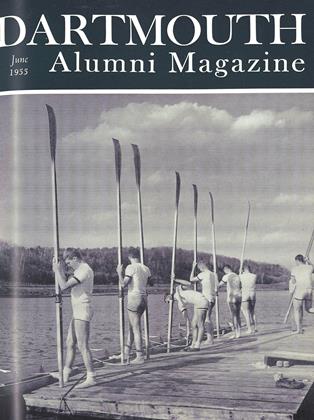FROM THE HANOVER HILLS
No fiction writer would have dared use so improbable an ending for a football game. But it happened in real life and Bob Blackman still winces every time he thinks of it. Blackman is the new Dartmouth football coach and, because he's a stranger to these parts, he was personally escorted to town the other day by Red Rolfe, the old Yankee thirdbaseman who is the athletic director at Hanover.
Strange indeed has been the career of the 36-year-old Blackman. His life has had so many odd twists that an extra implausible turn virtually could pass unnoticed. Yet the memory of this one game still lingers because it prevented him from being an unbeaten coach at the University of Denver last fall.
Blackman hadn't inherited too much when he accepted the Pioneer coaching portfolio in 1953. Denver won only three of ten games, losing five and tying two. In a marked reversal of form last season, it won nine of ten. It's that one loss that rankles so much.
It came in a battle between Denver and Wyoming early in the campaign. Blackman's well-drilled young men leaped into the lead and hung on doggedly. They were still holding it, 21 to 20, going into the closing minutes.
There were only sixteen seconds left to play when Fred Tesone burst off tackle for Denver to a first down on the Wyoming 40-yard line.
"That's it," shouted the jubilant Blackman on the sidelines. "They'll never catch us now."
Behind him rose the happy roar of the Denver rooters. That roar of delight instantly turned into one of dismay. After making the first down, Tesone had fumbled. A Wyoming man was conveniently injured in the scrimmage and that stopped the clock. But sixteen seconds wasn't much and Denver would certainly be alert enough to watch for a heavenhelp-us forward pass.
Denver was too alert. The pass spanned half the playing field and the defenders batted the ball away.
"That's it, I guess," said Blackmail again. But he said it anxiously this time, not jubilantly, almost as if he had a foreboding.
Downfield came the harsh blast of the field judge's whistle. Denver had been adjudged guilty of pass interference and it was Wyoming's ball in the vicinity of the Pioneer 10-yard line. There was time for only one play. A Cowboy from Brooklyn, Joe Mastrogiovanni, booted an 18-yard field goal and Denver lost, 23 to 21. Despite the loss, Denver won its first Skyline Conference championship in thirty-seven years.
The setback by Wyoming wasn't the first disappointment in Blackman's life and it isn't likely to be the last, considering the restrictiveness of Ivy league football.
Back in 1937 the 196-pound Blackman was co-captain of the freshman football team at Southern California. He was bursting with health when - but suppose we let him tell it.
"I never was in better condition in my life," he said in his soft, pleasant voice. "I was eating at the training table and living at a fraternity house. By midseason I was in the best shape I'd ever been in. That's when I was stricken by polio. It defies explanation. No one else caught it. I alone was stricken. I spent sixteen weeks in the hospital and six months on crutches. They said I'd never walk again but I fooled them...."
When Blackman was able to return to college, his playing days were over. He helped coach the freshman team for three seasons and was graduated cum laude from the School of Physical Education. One year of high school coaching and he finagled his way into the Navy, contriving to pass his physical examination without questions being raised.
In 1942 he coached the Naval Training Station football team at San Diego, handling professional and college stars' who were, for the most part, older than he. His team lost only one game, using a system of play he calls the V-formation.
It's a T-formation variation. His fullback is primarily a blocker rather than a line-cracker and can be stationed as wingback, blocking back or wherever he would be most useful in adding single-wing power to the deceptiveness of the T.
Without spring practice, though, Blackman is under an additional handicap in his first year at Dartmouth. But he has made a most favorable impression on all he has met. He is likely to do well in a rugged assignment.
The New York Times
 View Full Issue
View Full Issue
More From This Issue
-
 Feature
Feature"The Real Business"
June 1955 -
 Feature
FeatureTIMOTHY WAS BEFORE YOU
June 1955 By DANIEL CHASE '14 -
 Feature
FeatureOPERATION BOOTSTRAP
June 1955 By FRANK PEMBERTON -
 Article
ArticleStudent Report
June 1955 -
 Class Notes
Class Notes1918
June 1955 By ERNEST H. EARLEY, RICHARD A. HOLTON -
 Class Notes
Class Notes1923
June 1955 By CHESLEY T. BIXBY, THEODORE D. SHAPLEIGH







